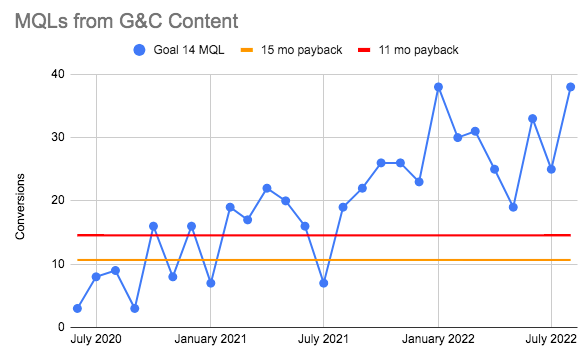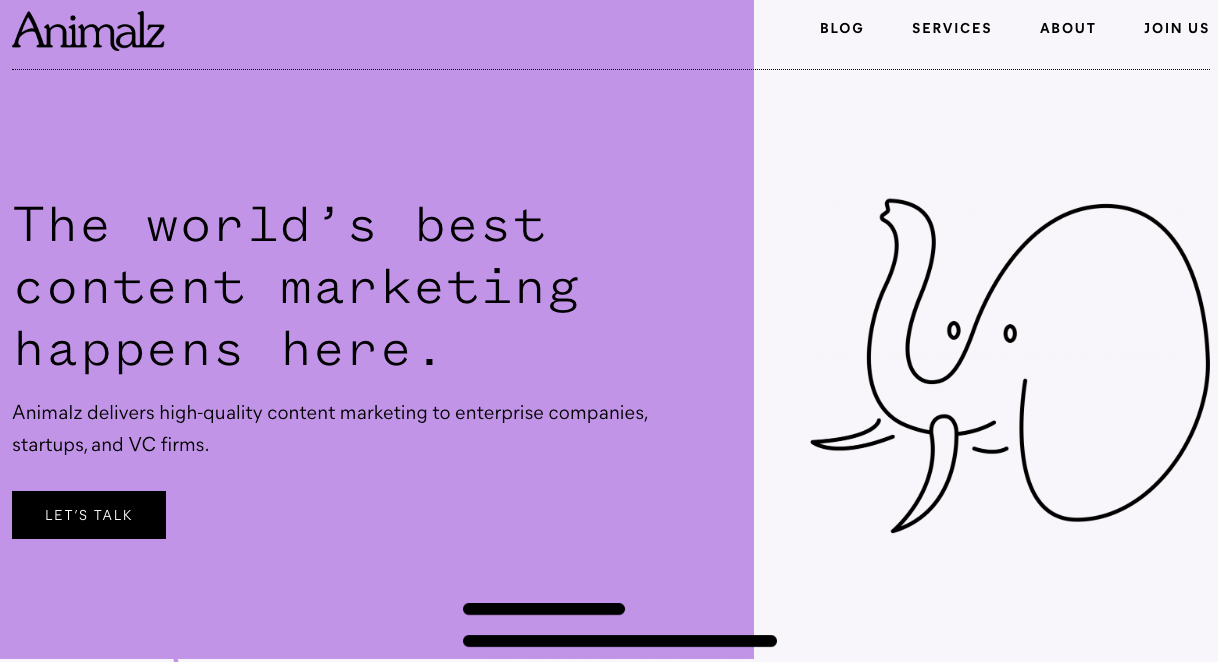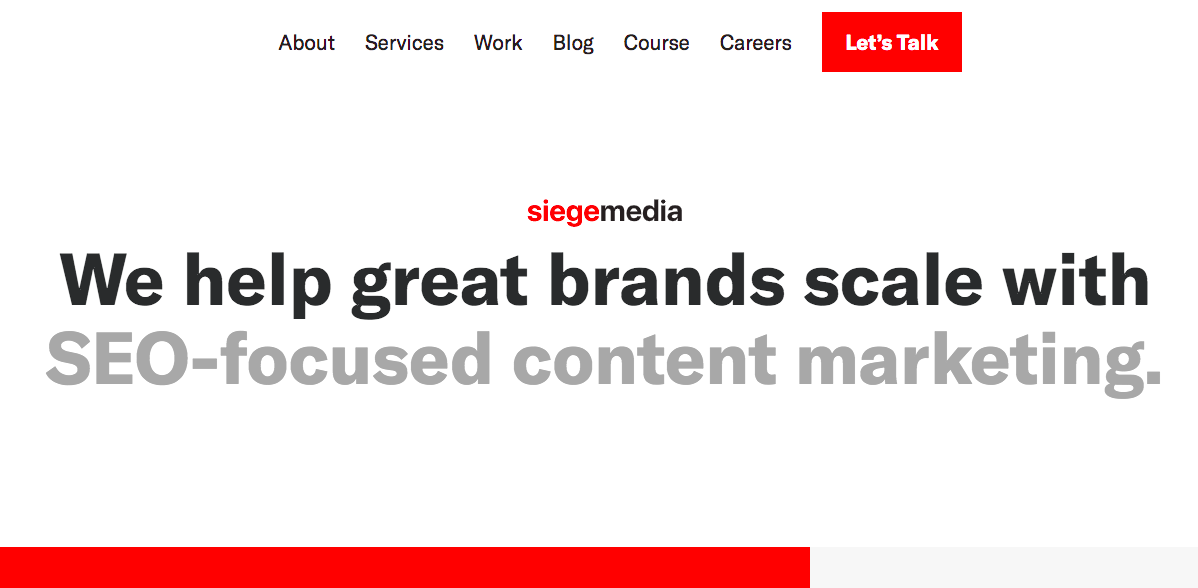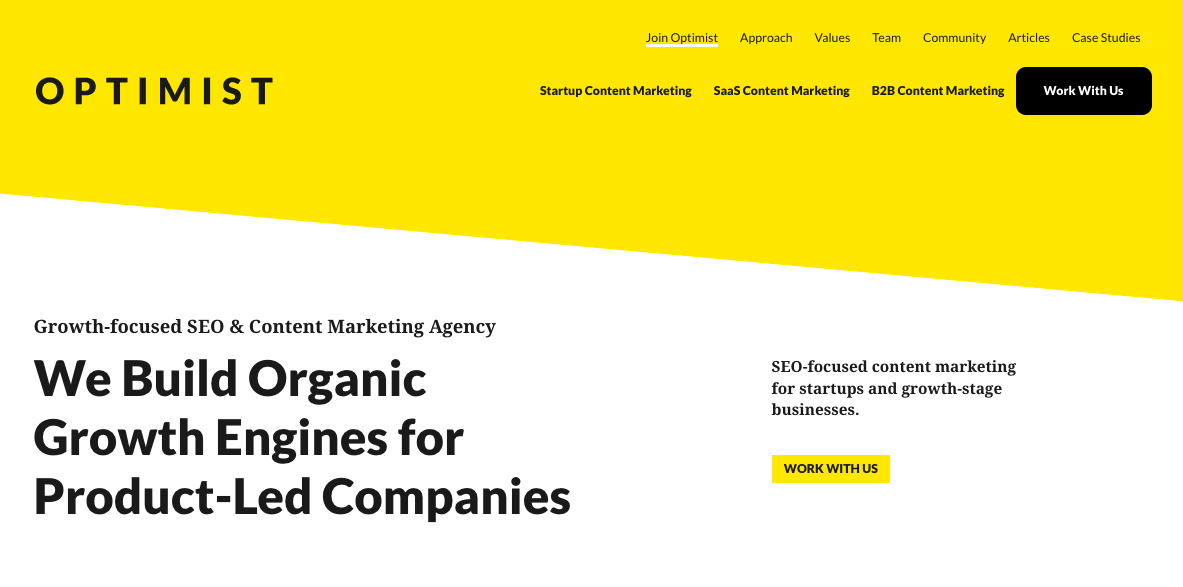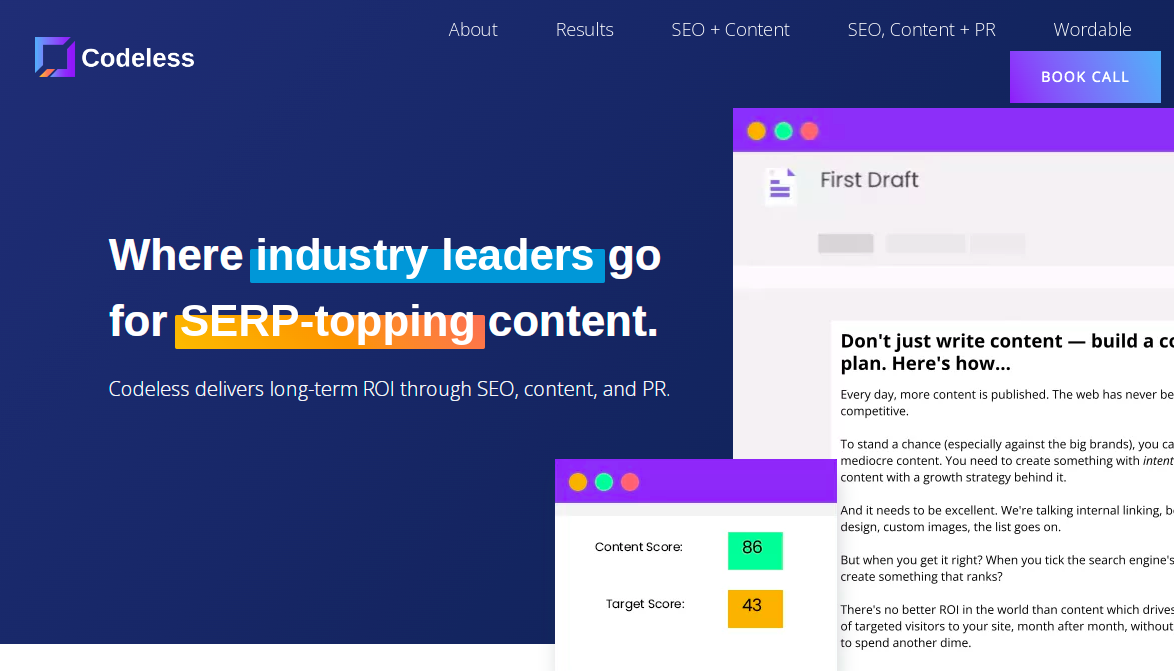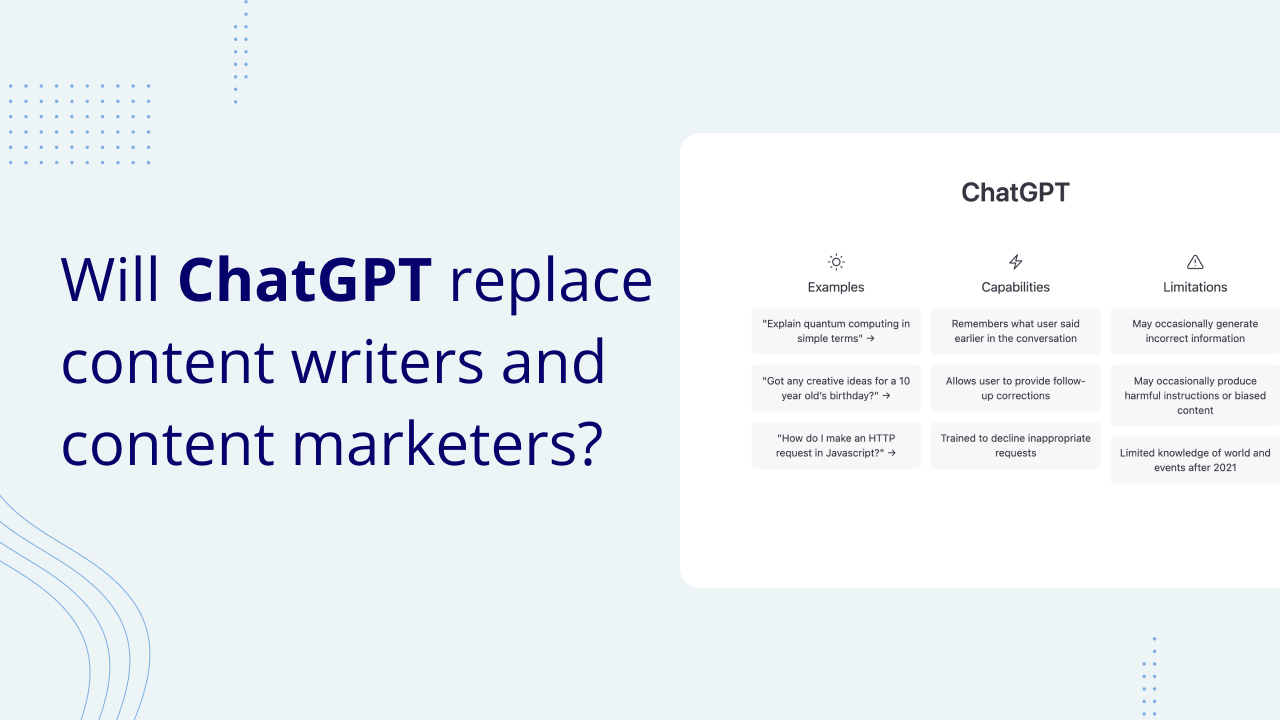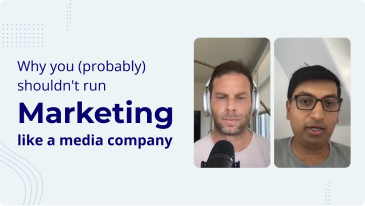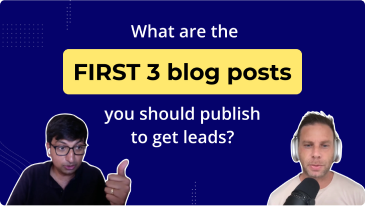We’ve been running our content marketing agency, Grow and Convert, for over 5 years now. In that time, we’ve worked with dozens of SaaS clients and talked to countless more. From these conversations, we now have a good sense of what SaaS companies are looking for in content marketing agencies, what they’re disappointed by in the ones that don’t work out, and what real success in an engagement looks like.
This article is meant to summarize those findings.
Specifically, we’re going to discuss 4 key factors that companies should consider when evaluating SaaS content marketing agencies:
- Factor #1: Which of these do you want from content marketing: traffic growth, email newsletter growth, or product signups? And is the agency’s content strategy optimized to achieve that goal.
This is the #1 factor you need to be clear on. In our experience, most SaaS companies want product signups while most content agencies are built to grow traffic and email newsletter signups. This mismatch causes problems.
- Factor #2: Do they have a process for gaining product and domain expertise, and expressing that through content?
- Factor #3: Do they have processes to actively promote the content they produce?
- Factor #4: Do they have detailed case studies that demonstrate the effectiveness of their strategy?
Below, we’ll explain how our agency addresses each of these factors. We’ll also address a question that many companies grapple with as they consider hiring an agency: Should you even hire a content marketing agency? Or would you be better off hiring someone in-house?
Lastly, since some companies like to evaluate multiple agencies, we’ll share names of 4 other content marketing agencies who we’ve heard come up a lot over the years.
4 Factors to Consider When Evaluating SaaS Content Marketing Agencies
Factor #1: What’s your goal from content (traffic, emails, trials, or demos)? And is their content strategy optimized to achieve that goal?
SaaS companies have different mindsets regarding the goal they hope to achieve from content marketing. In our experience, most want product signups — whether that be trials or demos — because that’s what they want out of all their marketing channels, including content. This makes sense.
But there are some, for example, later stage companies with existing large lead generation numbers, that may want to use content for traffic and email signup growth. Others just have a vague idea that they want to do content, and may not even realize that this is a choice they can make (i.e. they assume content is solely for getting traffic and brand awareness).
The first thing to understand is that this is a choice. You can optimize content around metrics like traffic and email signups (what most agencies do), or you can optimize content for generating trial and demo signups (what our agency does).
If you just want traffic, it will be much easier to find an agency whose strategy aligns with your goal.
However, most SaaS businesses ultimately want to see ROI from content, which means seeing trial and demo signups attributable to content and meaningful increases in monthly recurring revenue (MRR) over time.
In our experience, this requires a very different content marketing strategy (like the one that we use and have explained at length in previous articles like this and this).
That’s why we think this is the first and most important consideration when evaluating SaaS content agencies: Know your goal and figure out if the agency is built to satisfy it.
If your goal is customer acquisition, then ask the agencies you evaluate if that’s what their strategy is optimized for. Ask them to be very explicit about this:
- Is their process designed to produce content that gets trial and demo signups?
- How does it work to actually achieve that goal?
- Can they prove that it works?
Obviously if an agency is asked if their process produces trials and demos, they’re going to say yes, so you have to be very specific in your questioning. Focus on the second and third questions above, see if they can explain exactly how their process generates product signups (not email signups, those are very different) and if they can prove it works and give examples that make sense to you. Use your gut instinct — if you can’t figure out how their process will really get trials or demos to increase, it probably won’t.
The biggest complaint we hear from companies who’ve had bad experiences with agencies — and frankly the biggest complaint we had in our past experiences working with agencies — comes down to misalignment between what the agency optimizes content for, and what the company actually wants. So don’t skip this factor.
Factor #2: Do they have a process for expressing product and domain expertise through content?
Second, regardless of what your content marketing goal is, it’s important for whoever is producing your content to be able to express domain expertise in a way that feels native to your brand.
This is especially true for B2B SaaS companies whose target audiences are often advanced industry experts who need to be communicated with at an expert level. If you don’t speak to them at their level, you risk reputational damage and turning off potential customers.
Furthermore, if you choose to optimize your strategy for trial and demo signups, the topics you’ll write on will be very product-centric. This means whoever is writing your content will need in-depth knowledge of your product’s features, the nuanced pain points that they solve for customers, and the ways in which your product is differentiated from competitors.
Most outside agencies or freelance writers will not have this product and domain expertise, and therefore need to have a process for getting this information out of the minds of the experts at your company, and expressing it through your content.
However, what we’ve seen in the market is that many agencies and freelancers end up doing what we call “Google research papers.” Like a high school student doing a research paper, they Google around the topic they were given and regurgitate what everyone else is saying on a given topic.
This produces undifferentiated content that lacks product and domain expertise. So, when evaluating agencies, make sure you ask them:
- What is their process for being able to write and convey your value props, benefits, messaging, and differentiators in a way that feels native to your brand?
- Do they even have one?
- And if so, how does it work?
Is it a one-off interview at the beginning of the engagement? Is it a few one hour calls? Do they regularly interview experts at your company on a piece by piece basis?
We have found the latter approach — doing interviews on a piece by piece basis — to be both extremely rare when working with outside agencies, yet the most effective approach for expressing product and domain expertise through content. This is the approach we take at our agency, which we’ll discuss more below.
Factor #3: Do they actively promote the content they produce?
Content writing is just one facet of the content marketing process. For content marketing to work, it’s also necessary to do content promotion. This is what drives actual traffic to your articles.
So, another key thing to understand is what the agency offers with regards to content promotion. Is it included in their service? Sold separately? And what exactly do they do?
For example, do they just share the content they write via your own brand’s social media marketing channels (tweet it out for you, share it on your LinkedIn page, etc.)? Because that’s something you could easily do yourself.
Or, if they rely strictly on search engine optimization (SEO), is there anything they do in the short term to help drive traffic to articles during the time it takes for them to rank?
What an agency offers for promotion will determine what and how much you’ll need to do on your end to drive traffic to your articles, so this is a key issue to address.
Ensure They Don’t Use a “Keyword Sprinkling” Strategy and Call That SEO
We’ve spoken with several clients who’ve had bad past experiences with SaaS SEO agencies. And after digging into the content those agencies were producing, we’ve learned that often agencies use a “keyword sprinkling” strategy.
Essentially, they’ll create “SEO” articles by simply “sprinkling” a bunch of keywords throughout articles. But as we’ve explained in our article on SEO content writing, ranking highly for valuable keywords takes a significantly more strategic approach than this — specifically, for the most valuable and competitive keywords, you need to have one single article completely optimized for a single keyword.
If an agency says that they primarily rely on SEO to drive traffic, be sure to have them explain to you how they go about ranking content for specific keywords. Ask them:
- What’s your process for doing keyword research?
- How do you choose keywords to target?
- What’s your process for analyzing search engine results pages (SERPs)?
- How do you reflect those analyses in your writing to get articles to rank?
- Can you show us examples of articles you’ve written that are ranking highly in Google?
Agencies worth hiring will be able to answer these questions in detail and show you results they’ve gotten for other clients.
Note: We’ve published a detailed article on our SEO writing process which you can read here. We’ve also published a detailed case study on SEO rankings data from 20 active and former clients which you can find here.
Factor #4: Do they have detailed case studies that demonstrate the effectiveness of their strategy?
It’s very common for agencies to share a lot of theoretical advice and information, but show little to no data or case studies that back up what they say and prove that their strategies work. It’s also common for them to just put up quotes from past clients or random stats like “we grew X company’s organic traffic by 200%.”
These types of testimonials and unsupported claims are not reliable proof that an agency can do what they say. So, an essential thing to look for is whether or not an agency has published the results they’ve achieved for clients, and specifically explained the details behind how they achieved those results.
Otherwise, you just have to blindly trust their level of competency, which leads to very inconsistent experiences with agencies.
When reviewing agency case studies, look for details about the work behind the results. For example, if they’re claiming they increased traffic by some percentage for a past client, figure out:
- How many articles did it take?
- Did one article produce most of that or was it spread out?
- What keywords did they rank for?
- How and why did they choose those keywords?
- How long did it take to rank?
- What was the domain authority of that client at the start and end? Did they do link building?
- What didn’t work?
The more transparent agencies are with the results they’ve achieved and the ways in which they got those results, the more you can trust them to be able to replicate those types of results for your business.
Now, let’s walk through how our agency has addressed each of these factors, including the details of our SaaS content strategy, our writing and promotion processes, and 5 long-form SaaS case studies we’ve published to prove the effectiveness of our strategy.
Grow and Convert’s Process: How We’ve Addressed Each of These Factors
1. Our Content Strategy Is Optimized to Drive Trial & Demo Signups
We’ve optimized our SaaS content strategy to drive trial and demo signups (versus traffic and email signups) for two key reasons:
- Most companies want to see ROI from content. Sooner or later, most SaaS brands that invest in a content agency want to see some form of measurable ROI. We learned early on that if we can show ROI to clients (in particular management and executive teams), the engagements last longer, allowing results to compound while making everyone happy.
- There’s a significant volume of people actively looking to buy SaaS products. For almost every SaaS company, outside of rare category-creating products, there is some significant volume of people who are actively looking to buy that type of product — or solve pain points that product solves. These people are Googling terms that indicate they are ready to buy. Our perspective is that it makes way more sense from a business standpoint that a content strategy goes after these ready-to-buy-now people first, before trying to reach the people higher in the funnel.
We’ve written at length about how we go about driving trials and demos through content. Check out these SaaS-specific articles for detailed walkthroughs on our philosophy and process.
Philosophy
Strategy and Writing Process
How We Hold Ourselves Accountable
For every one of our clients, we create an ROI graph like this one (a live graph from a B2B SaaS client we’ve been working with for over 2 years):
The horizontal lines represent the number of leads this client needs per month to break even on their monthly spend with us. Each month, we plot the number of leads from our articles on this graph. Then we report on our progress in relation to that break even number so clients can see when they begin to have positive ROI.
We’ve written extensively about how we do this here and here, including more case studies and client data. Before we started our agency, this is the type of thing we were looking for but could never find. And we feel this is the number one differentiator of our agency.
2. We Use an Interview-Based Writing Process to Express Product and Domain Expertise Through Content
We don’t produce articles in the “Google research paper” style we described above (where we just self-research a topic and write up what we found, trying ourselves to become the experts).
Instead, our writers start by interviewing people inside your organization who have the know-how and expertise to speak on that topic and convey how your product and your company has innovated or differentiated itself in the topic area of the article.
Thus, the writer is not asked to pretend to be an expert themselves. This is a massive shift from traditional content services and is essential to producing genuinely high-quality content.
We’re not talking about grabbing a few quotes from experts to throw into an article. We’re talking about hour-long recorded interviews where we shape an entire article around the viewpoint and knowledge of an expert inside your company, who can not only speak to the topic area but also tie-in your product.
This changes everything. It creates true thought leadership content, and adds genuine product expertise into our BOTF pieces discussed above because we’re able to include all the detail and nuance of how your product is differentiated, what it replaces, why features were designed in certain ways, and more that only product experts inside your company would know.
3. We Use a Two Pronged Content Promotion Process
To drive traffic to your articles as we wait for them to rank in Google, we use a two pronged promotion strategy to drive both short and long term traffic. Specifically:
- Paid Ads / PPC Marketing Campaigns (short term traffic): We use paid ads to promote content using two targeting methods: Cold audiences (using interest and demographic based targeting) and lookalike audiences (based on the client’s existing customer list or website visitors). We test paid channels such as Facebook, Twitter, Linkedin, and Google Ads based on each client and where we’re most likely to reach their audience.
- Manual Link Building (long term traffic): When certain pieces start ranking for keywords, we strategically deploy link building to boost them to page 1 or the top of page 1 in Google.
The combination of these two steps gives our pieces a short term boost in traffic followed by long term sustainable organic traffic that adds up from different articles and grows over time.
We do all of the above from our own budget, with no extra spend for our clients, making us a truly full-service agency. This is markedly different from other marketing agencies and something we’re very proud of offering our clients.
4. We Publish Detailed SaaS Case Studies to Demonstrate and Prove the Effectiveness of Our Content Strategy
Here are 5 case studies you can read to see how we’ve executed our content strategy for real SaaS businesses:
Finally, if you’re interested, you can learn more about our agency, pricing, and reach out about working with us here.
Below we’re going to share 4 other content marketing agencies we’ve heard come up over the years, so you can weigh other options. But before we get to that, let’s briefly cover a question looming in the minds of SaaS founders, heads of demand generation, and in-house SaaS marketers considering hiring an agency: Should you even hire one or would you be better off hiring in-house?
Should You Hire a Content Marketing Agency or Build a Team In-House?
Over the years, we’ve spoken to many companies who are considering hiring us and at the same time considering bringing someone in-house. And very often, companies lean toward making an in-house hire.
We think the biggest reason for this is that by hiring someone in-house, they feel the content marketer will more deeply understand the details of their product and their company — and therefore be more trusted and capable of acquiring the product and domain expertise we discussed above. This is in contrast to agencies, where most of them assign articles to writers without domain knowledge or any process to acquire and express expertise through their content.
However, because of the interview-based content writing process we use at Grow and Convert, this isn’t a problem when you work with our agency. And in fact, if this problem is solved, there are actually many additional benefits of hiring an agency compared to an in-house employee.
Specifically:
- Speed to Get Up and Running: If you hire an in-house content marketer, it may take 3 to 6 months for them to create a content marketing plan and get content production up and running, let alone the time it will take for that content to begin producing results. Whereas, an agency has processes in place to get up and running immediately, speeding up the time it takes to get results from content. In contrast, as shown in our post on how long it takes to rank in Google, we typically have 25 – 35 articles ranking on page 1 of their intended keywords in the first 12 months.
- A Team vs. an Individual: Effective content marketing takes a variety of digital marketing skills and areas of expertise, and often one person won’t have all of the skills to execute the strategy, the writing, and the promotion, etc. Companies often think they can hire just a writer, or just a strategist, and later realize that they actually need more than one individual to carry out their content marketing efforts. In contrast, when working with our agency, there are often 3 to 5 people with different areas of expertise working together on your account — which has distinct advantages over relying on a single person. For example, we have content strategists, writers, a paid ads specialist, project manager, and designer ready to deploy for each client.
- Strategy & Deep Expertise: Particularly for companies that want to optimize their strategy for driving product signups, it’s difficult to find and hire an in-house content marketer with experience developing that type of content strategy and writing pieces that both rank for valuable keywords and sell products. This is in part due to a culture in content marketing — most content marketers subscribe to the belief that content is just for driving traffic and brand awareness, and so that’s how they operate and what they know. In contrast, when working with our agency, we have established hiring and training processes that ensure our strategists and writers have the expertise to execute signup-driven content strategies.
It’s perfectly understandable to want to hire an in-house content marketer instead of an agency, but it is worth considering the advantages that agencies can offer.
Other SaaS Content Marketing Agencies Whose Names We Often Hear
To help SaaS businesses weigh different agency options, here are a few other content marketing agencies whose names we’ve heard repeatedly either through clients having worked with them in the past or just through colleagues in our marketing agency.
Note: We haven’t directly worked with any of these agencies, so we can’t independently vouch for the quality of their work. But that’s why we outlined the 4 key factors for evaluating a SaaS content marketing agency above, so you can evaluate them. If you want to reach out to these agencies, we recommend you ask them about each factor and evaluate for yourself if and how they have a process to address them.
1. Animalz
According to their website, Animalz provides content marketing services to enterprise companies, startups, and VC firms. They list having worked with companies such as Google, Amazon, Airtable, and others. And they provide a variety of services including SEO consulting, brand awareness, lead generation, product marketing, and promotion and distribution.
Visit their site for more information about their services, team, podcast, and more.
2. Siege Media
Siege Media is an SEO-focused content marketing agency that offers SEO, content creation, graphic design, and link building services to businesses. They list having worked with companies such as Zillow, Shutterfly, Tripadvisor, and others. And they say their marketing solutions have generated over $86,856,000 in yearly client traffic value.
Visit their site for more information.
3. Optimist
Optimist is an SEO-focused content marketing agency for startups and growth-stage businesses. They specialize in working with product-led companies, and list having worked with companies such as Contentstack, FairShake, and HelloSign. Their services are broken out into startup content marketing, SaaS content marketing, and B2B content marketing.
Visit their site for more information.
4. Codeless
Codeless is a content production company offering a variety of SEO, content, and PR services. They say they create a proven, customized workflow for every client, and list having worked with companies such as Monday, Zapier, ActiveCampaign, and others.
Visit their site for more information.
Want to work with us or learn how to implement our B2B content strategy?
- Our Agency: You can learn more about working with us here.
- Our Content Marketing Course: Individuals looking to learn how to grow their SaaS business with content can join our private course, taught via case studies, here. We include a lot of information and examples not found on this blog. Our course is also built into a community, so people ask questions, start discussions, and share their work in the lesson pages themselves, and we and other members give feedback. We also get on live Zoom calls about once a month and dissect members’ actual content strategies and brainstorm ideas on how we’d form content strategies for their businesses.
- Join Our Content Marketing Team: Alternatively, if this style of B2B content marketing appeals to you, consider joining our content marketing team as a writer or content strategist. We have awesome clients. We’re a remote company. We pay well. And you won’t have to stress about getting your own clients or spend a bunch of time doing outreach to get them.
Questions? Comments? Feel free to share them in the comments below and we’ll respond.


